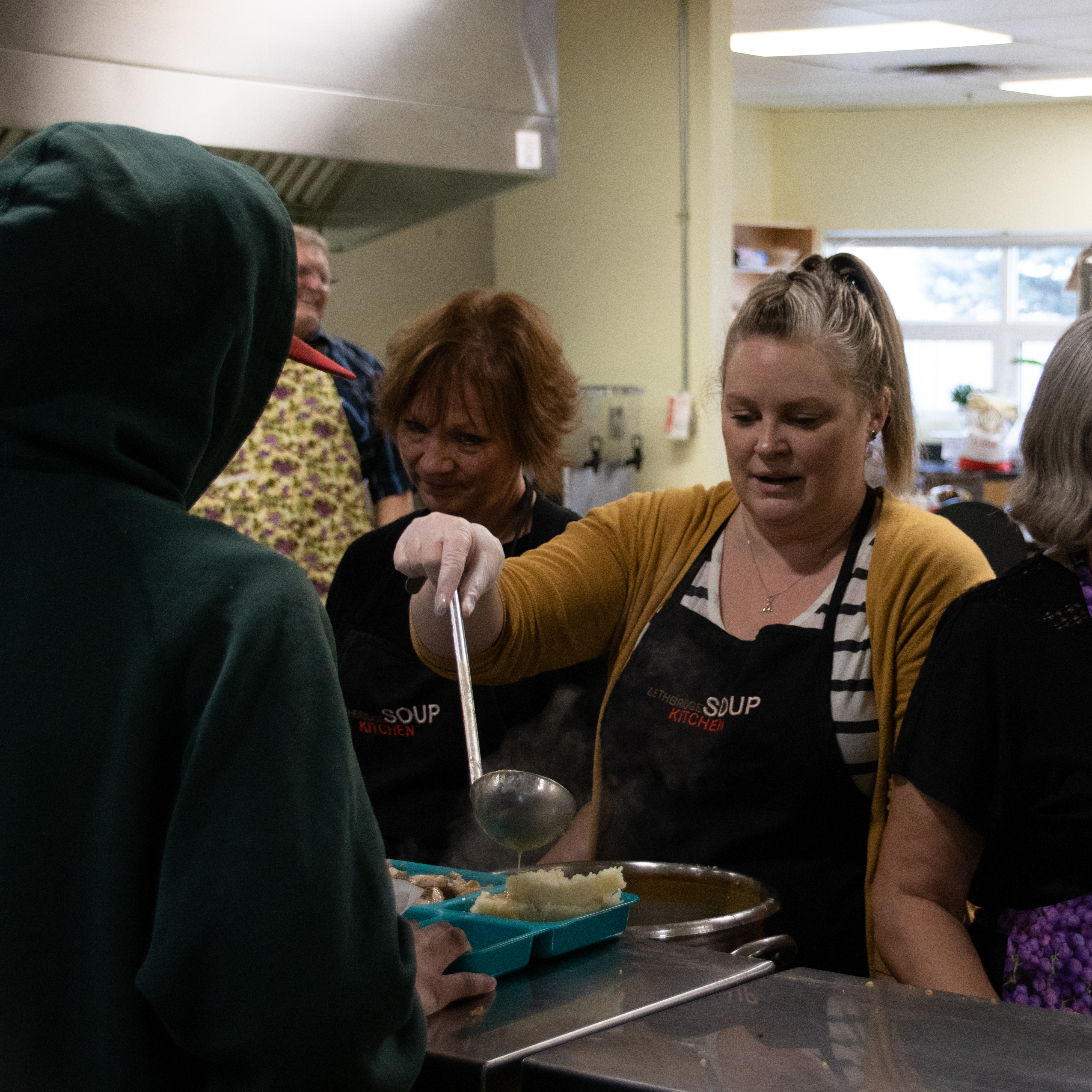Erin Nordquist serves Thanksgiving dinner at the Lethbridge Soup Kitchen on Oct. 14.
There was a murmur in the air as people shuffled in line, waiting their turn for what may be their first hot meal in a long time. On the other side of the counter, about a dozen volunteers were busy bringing in food, washing dishes and serving Thanksgiving dinner to Lethbridge’s homeless.
“We refer to them as our homeless neighbours because for us, they’re neighbours. They’re not clients, they’re not just people from the streets,” said Bill Ginther, executive director for the Lethbridge Soup Kitchen.
It is difficult to think about what the guests at the kitchen would say they are thankful for, given the challenges they face each day.
“These people here are my family. This is a very big day. I lost my husband two months ago – this is my family and I was really worried about not being here today because I just got out of somewhere I didn’t want to be,” said Patricia McCallum, who has been coming to Thanksgiving dinner at the soup kitchen for years.
McCallum and her husband lived in the shelter for three and a half years before he passed away due to an overdose.
“My husband, Peter, used to be a caseworker here,” she began, stopping to compose herself for about 10 seconds as tears appeared. “He worked here for about 15 years and then when we became homeless, we came. We’ve been living down here for four years.”
Peter struggled with an off-and-on drug problem, according to McCallum, who added they both grew up in homes affected by substance addiction.
“This is the hardest thing I’ve ever had to do in my entire life…to do this without him, but I’m going to try as hard as I can,” McCallum said. “I really wish he would have been here today. The first holiday without him is pretty hard and I’m not looking forward to Christmas.”
She and her husband lost custody of their children and found themselves living in the shelter, trying to get their lives back on track.
“About four years ago, he lost his job. He had a really good job at the family centre. We lost our home, our vehicles, his job, our children and on July 5 this year, I lost him,” said McCallum.
She is one of about 100 people who attended Thanksgiving dinner at the soup kitchen this year.

“There is a tremendous need for services for people and we’re the only ones in this city that provide a hot meal,” said Ginther.
The soup kitchen opened 35 years ago and Ginther became the director six years ago, after moving to the city from Saskatoon.
He said the numbers have gone up recently, though he added they are cyclical and dependent on factors such as weather.
“Lethbridge, other than these past few weeks, has been known to have mild winters. So, a lot of people come this way from other cities,” said the former international relief and development worker.
Volunteers from Via Church were serving food and helping the staff on Thanksgiving Monday.
“When you volunteer consistently, you get to know some of the clients’ faces and names. Often, if I have the chance, I’ll go out and sit with them and find out how their day is going, hear a little bit of their story,” said Amy Braun, one of the church’s pastors.
Ginther and his staff depend on more than 700 volunteers to continue serving food to people in need.
He said the number of people reaching out for services from local agencies is growing and putting pressure on those organizations.
“They are overwhelmed with our supervised consumption site. It brings more people into the city and so we’re fighting – I don’t want to say a losing battle – but it’s an uphill battle,” said Ginther.
The soup kitchen is doing well in terms of supply and volunteers despite the increase in demand for a hot meal, according to its executive director.
“Some of our grandchildren joke that I know more homeless people than people without a home, which is probably true. And I wish we could change that,” he said.
After the meal is finished, it is back to the shelter or the streets for McCallum and back to a hard life.
“Sometimes it gets misjudged or misconstrued about the things that happen down here and how we are. We’re not like that, everybody’s different,” said McCallum, adding she wished people from the community would make an effort to get to know her and other people her situation.



